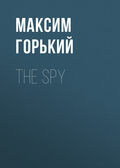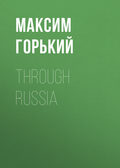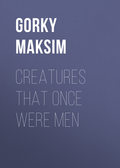
Максим Горький
The Man Who Was Afraid
CHAPTER XI
“LUBAVKA!” said Mayakin one day when he came home from the Exchange, “prepare yourself for this evening. I am going to bring you a bridegroom! Prepare a nice hearty little lunch for us. Put out on the table as much of our old silverware as possible, also bring out the fruit-vases, so that he is impressed by our table! Let him see that each and everything we have is a rarity!”
Lubov was sitting by the window darning her father’s socks, and her head was bent low over her work.
“What is all this for, papa?” she asked, dissatisfied and offended.
“Why, for sauce, for flavour. And then, it’s in due order. For a girl is not a horse; you can’t dispose of her without the harness.”
All aflush with offence, Lubov tossed her head nervously, and flinging her work aside, cast a glance at her father; and, taking up the socks again, she bent her head still lower over them. The old man paced the room to and fro, plucking at his fiery beard with anxiety; his eyes stared somewhere into the distance, and it was evident that he was all absorbed in some great complicated thought. The girl understood that he would not listen to her and would not care to comprehend how degrading his words were for her. Her romantic dreams of a husband-friend, an educated man, who would read with her wise books and help her to find herself in her confused desires, these dreams were stifled by her father’s inflexible resolution to marry her to Smolin. They had been killed and had become decomposed, settling down as a bitter sediment in her soul. She had been accustomed to looking upon herself as better and higher than the average girl of the merchant class, than the empty and stupid girl who thinks of nothing but dresses, and who marries almost always according to the calculation of her parents, and but seldom in accordance with the free will of her heart. And now she herself is about to marry merely because it was time, and also because her father needed a son-in-law to succeed him in his business. And her father evidently thought that she, by herself, was hardly capable of attracting the attention of a man, and therefore adorned her with silver. Agitated, she worked nervously, pricked her fingers, broke needles, but maintained silence, being aware that whatever she should say would not reach her father’s heart.
And the old man kept on pacing the room to and fro, now humming psalms softly, now impressively instructing his daughter how to behave with the bridegroom. And then he also counted something on his fingers, frowned and smiled.
“Mm! So! Try me, Oh Lord, and judge me. From the unjust and the false man, deliver me. Yes! Put on your mother’s emeralds, Lubov.”
“Enough, papa!” exclaimed the girl, sadly. “Pray, leave that alone.”
“Don’t you kick! Listen to what I’m telling you.”
And he was again absorbed in his calculations, snapping his green eyes and playing with his fingers in front of his face.
“That makes thirty-five percent. Mm! The fellow’s a rogue. Send down thy light and thy truth.”
“Papa!” exclaimed Lubov, mournfully and with fright.
“What?”
“You – are you pleased with him?”
“With whom?
“Smolin.”
“Smolin? Yes, he’s a rogue, he’s a clever fellow, a splendid merchant! Well, I’m off now. So be on your guard, arm yourself.”
When Lubov remained alone she flung her work aside and leaned against the back of her chair, closing her eyes tightly. Her hands firmly clasped together lay on her knees, and their fingers twitched. Filled with the bitterness of offended vanity, she felt an alarming fear of the future, and prayed in silence:
“My God! Oh Lord! If he were only a kind man! Make him kind, sincere. Oh Lord! A strange man comes, examines you, and takes you unto himself for years, if you please him! How disgraceful that is, how terrible. Oh Lord, my God! If I could only run away! If I only had someone to advise me what to do! Who is he? How can I learn to know him? I cannot do anything! And I have thought, ah, how much I have thought! I have read. To what purpose have I read? Why should I know that it is possible to live otherwise, so as I cannot live? And it may be that were it not for the books my life would be easier, simpler. How painful all this is! What a wretched, unfortunate being I am! Alone. If Taras at least were here.”
At the recollection of her brother she felt still more grieved, still more sorry for herself. She had written to Taras a long, exultant letter, in which she had spoken of her love for him, of her hope in him; imploring her brother to come as soon as possible to see his father, she had pictured to him plans of arranging to live together, assuring Taras that their father was extremely clever and understood everything; she told about his loneliness, had gone into ecstasy over his aptitude for life and had, at the same time, complained of his attitude toward her.
For two weeks she impatiently expected a reply, and when she had received and read it she burst out sobbing for joy and disenchantment. The answer was dry and short; in it Taras said that within a month he would be on the Volga on business and would not fail to call on his father, if the old man really had no objection to it. The letter was cold, like a block of ice; with tears in her eyes she perused it over and over again, rumpled it, creased it, but it did not turn warmer on this account, it only became wet. From the sheet of stiff note paper which was covered with writing in a large, firm hand, a wrinkled and suspiciously frowning face, thin and angular like that of her father, seemed to look at her.
On Yakov Tarasovich the letter of his son made a different impression. On learning the contents of Taras’s reply the old man started and hastily turned to his daughter with animation and with a peculiar smile:
“Well, let me see it! Show it to me! He-he! Let’s read how wise men write. Where are my spectacles? Mm! ‘Dear sister!’ Yes.”
The old man became silent; he read to himself the message of his son, put it on the table, and, raising his eyebrows, silently paced the room to and fro, with an expression of amazement on his countenance. Then he read the letter once more, thoughtfully tapped the table with his fingers and spoke:
“That letter isn’t bad – it is sound, without any unnecessary words. Well? Perhaps the man has really grown hardened in the cold. The cold is severe there. Let him come, we’ll take a look at him. It’s interesting. Yes. In the psalm of David concerning the mysteries of his son it is said: ‘When Thou hast returned my enemy’ – I’ve forgotten how it reads further. ‘My enemy’s weapons have weakened in the end, and his memory hath perished amid noise. Well, we’ll talk it over with him without noise.”
The old man tried to speak calmly and with a contemptuous smile, but the smile did not come; his wrinkles quivered irritably, and his small eyes had a particularly clear brilliancy.
“Write to him again, Lubovka. ‘Come along!’ write him, ‘don’t be afraid to come!’”
Lubov wrote Taras another letter, but this time it was shorter and more reserved, and now she awaited a reply from day to day, attempting to picture to herself what sort of man he must be, this mysterious brother of hers. Before she used to think of him with sinking heart, with that solemn respect with which believers think of martyrs, men of upright life; now she feared him, for he had acquired the right to be judge over men and life at the price of painful sufferings, at the cost of his youth, which was ruined in exile. On coming, he would ask her:
“You are marrying of your own free will, for love, are you not?”
What should she tell him? Would he forgive her faint-heartedness? And why does she marry? Can it really be possible that this is all she can do in order to change her life?
Gloomy thoughts sprang up one after another in the head of the girl and confused and tortured her, impotent as she was to set up against them some definite, all-conquering desire. Though she was in an anxious and compressing her lips. Smolin rose from his chair, made a step toward her and bowed respectfully. She was rather pleased with this low and polite bow, also with the costly frock coat, which fitted Smolin’s supple figure splendidly. He had changed but slightly – he was the same red-headed, closely-cropped, freckled youth; only his moustache had become long, and his eyes seemed to have grown larger.
“Now he’s changed, eh?” exclaimed Mayakin to his daughter, pointing at the bridegroom. And Smolin shook hands with her, and smiling, said in a ringing baritone voice:
“I venture to hope that you have not forgotten your old friend?”
“It’s all right! You can talk of this later,” said the old man, scanning his daughter with his eyes.
“Lubova, you can make your arrangements here, while we finish our little conversation. Well then, African Mitrich, explain yourself.”
“You will pardon me, Lubov Yakovlevna, won’t you?” asked Smolin, gently.
“Pray do not stand upon ceremony,” said Lubov. “He’s polite and clever,” she remarked to herself; and, as she walked about in the room from the table to the sideboard, she began to listen attentively to Smolin’s words. He spoke softly, confidently, with a simplicity, in which was felt condescendence toward the interlocutor. “Well then, for four years I have carefully studied the condition of Russian leather in foreign markets. It’s a sad and horrid condition! About thirty years ago our leather was considered there as the standard, while now the demand for it is constantly falling off, and, of course, the price goes hand in hand with it. And that is perfectly natural. Lacking the capital and knowledge all these small leather producers are not able to raise their product to the proper standard, and, at the same time, to reduce the price. Their goods are extremely bad and dear. And they are all to blame for having spoiled Russia’s reputation as manufacturer of the best leather. In general, the petty producer, lacking the technical knowledge and capital, is consequently placed in a position where he is unable to improve his products in proportion to the development of the technical side. Such a producer is a misfortune for the country, the parasite of her commerce.”
“Hm!” bellowed the old man, looking at his guest with one eye, and watching his daughter with the other. “So that now your intention is to build such a great factory that all the others will go to the dogs?”
“Oh, no!” exclaimed Smolin, warding off the old man’s words with an easy wave of the hand. “Why wrong others? What right have I to do so? My aim is to raise the importance and price of Russian leather abroad, and so equipped with the knowledge as to the manufacture, I am building a model factory, and fill the markets with model goods. The commercial honour of the country!”
“Does it require much capital, did you say?” asked Mayakin, thoughtfully.
“About three hundred thousand.”
“Father won’t give me such a dowry,” thought Lubov.
“My factory will also turn out leather goods, such as trunks, foot-wear, harnesses, straps and so forth.”
“And of what per cent, are you dreaming?”
“I am not dreaming, I am calculating with all the exactness possible under conditions in Russia,” said Smolin, impressively. “The manufacturer should be as strictly practical as the mechanic who is creating a machine. The friction of the tiniest screw must be taken into consideration, if you wish to do a serious thing seriously. I can let you read a little note which I have drawn up, based upon my personal study of cattle-breeding and of the consumption of meat in Russia.”
“How’s that!” laughed Mayakin. “Bring me that note, it’s interesting! It seems you did not spend your time for nothing in Western Europe. And now, let’s eat something, after the Russian fashion.”
“How are you passing the time, Lubov Yakovlevna?” asked Smolin, arming himself with knife and fork.
“She is rather lonesome here with me,” replied Mayakin for his daughter. “My housekeeper, all the household is on her shoulders, so she has no time to amuse herself.”
“And no place, I must add,” said Lubov. “I am not fond of the balls and entertainments given by the merchants.”
“And the theatre?” asked Smolin.
“I seldom go there. I have no one to go with.”
“The theatre!” exclaimed the old man. “Tell me, pray, why has it become the fashion then to represent the merchant as a savage idiot? It is very amusing, but it is incomprehensible, because it is false! Am I a fool, if I am master in the City Council, master in commerce, and also owner of that same theatre? You look at the merchant on the stage and you see – he isn’t life-life! Of course, when they present something historical, such as: ‘Life for the Czar,’ with song and dance, or ‘Hamlet,’ ‘The Sorceress,’ or ‘Vasilisa,’ truthful reproduction is not required, because they’re matters of the past and don’t concern us. Whether true or not, it matters little so long as they’re good, but when you represent modern times, then don’t lie! And show the man as he really is.”
Smolin listened to the old man’s words with a covetous smile on his lips, and cast at Lubov glances which seemed to invite her to refute her father. Somewhat embarrassed, she said:
“And yet, papa, the majority of the merchant class is uneducated and savage.”
“Yes,” remarked Smolin with regret, nodding his head affirmatively, “that is the sad truth.”
“Take Foma, for instance,” went on the girl.
“Oh!” exclaimed Mayakin. “Well, you are young folks, you can have books in your hands.”
“And do you not take interest in any of the societies?” Smolin asked Lubov. “You have so many different societies here.”
“Yes,” said Lubov with a sigh, “but I live rather apart from everything.”
“Housekeeping!” interposed the father. “We have here such a store of different things, everything has to be kept clean, in order, and complete as to number.”
With a self-satisfied air he nodded first at the table, which was set with brilliant crystal and silverware, and then at the sideboard, whose shelves were fairly breaking under the weight of the articles, and which reminded one of the display in a store window. Smolin noted all these and an ironical smile began to play upon his lips. Then he glanced at Lubov’s face: in his look she caught something friendly, sympathetic to her. A faint flush covered her cheeks, and she said to herself with timid joy:
“Thank God!”
The light of the heavy bronze lamp now seemed to flash more brilliantly on the sides of the crystal vases, and it became brighter in the room.
“I like our dear old town!” said Smolin, looking at the girl with a kindly smile, “it is so beautiful, so vigorous; there is cheerfulness about it that inspires one to work. Its very picturesqueness is somewhat stimulating. In it one feels like leading a dashing life. One feels like working much and seriously. And then, it is an intelligent town. Just see what a practical newspaper is published here. By the way, we intend to purchase it.”
“Whom do you mean by You?” asked Mayakin.
“I, Urvantzov, Shchukin – ”
“That’s praiseworthy!” said the old man, rapping the table with his hand. “That’s very practical! It is time to stop their mouths, it was high time long ago! Particularly that Yozhov; he’s like a sharp-toothed saw. Just put the thumb-screw on him! And do it well!”
Smolin again cast at Lubov a smiling glance, and her heart trembled with joy once more. With flushing face she said to her father, inwardly addressing herself to the bridegroom:
“As far as I can understand, African Dmitreivich, he wishes to buy the newspaper not at all for the sake of stopping its mouth as you say.”
“What then can be done with it?” asked the old man, shrugging his shoulders. “There’s nothing in it but empty talk and agitation. Of course, if the practical people, the merchants themselves, take to writing for it – ”
“The publication of a newspaper,” began Smolin, instructively, interrupting the old man, “looked at merely from the commercial point of view, may be a very profitable enterprise. But aside from this, a newspaper has another more important aim – that is, to protect the right of the individual and the interests of industry and commerce.”
“That’s just what I say, if the merchant himself will manage the newspaper, then it will be useful.”
“Excuse me, papa,” said Lubov.
She began to feel the need of expressing herself before Smolin; she wanted to assure him that she understood the meaning of his words, that she was not an ordinary merchant-daughter, interested in dresses and balls only. Smolin pleased her. This was the first time she had seen a merchant who had lived abroad for a long time, who reasoned so impressively, who bore himself so properly, who was so well dressed, and who spoke to her father, the cleverest man in town, with the condescending tone of an adult towards a minor.
“After the wedding I’ll persuade him to take me abroad,” thought Lubov, suddenly, and, confused at this thought she forgot what she was about to say to her father. Blushing deeply, she was silent for a few seconds, seized with fear lest Smolin might interpret this silence in a way unflattering to her.
“On account of your conversation, you have forgotten to offer some wine to our guest,” she said at last, after a few seconds of painful silence.
“That’s your business. You are hostess,” retorted the old man.
“Oh, don’t disturb yourself!” exclaimed Smolin, with animation. “I hardly drink at all.”
“Really?” asked Mayakin.
“I assure you! Sometimes I drink a wine glass or two in case of fatigue or illness. But to drink wine for pleasure’s sake is incomprehensible to me. There are other pleasures more worthy of a man of culture.”
“You mean ladies, I suppose?” asked the old man with a wink.
Smolin’s cheeks and neck became red with the colour which leaped to his face. With apologetic eyes he glanced at Lubov, and said to her father drily:
“I mean the theatre, books, music.”
Lubov became radiant with joy at his words.
The old man looked askance at the worthy young man, smiled keenly and suddenly blurted out:
“Eh, life is going onward! Formerly the dog used to relish a crust, now the pug dog finds the cream too thin; pardon me for my sour remark, but it is very much to the point. It does not exactly refer to yourself, but in general.”
Lubov turned pale and looked at Smolin with fright. He was calm, scrutinising an ancient salt box, decorated with enamel; he twisted his moustache and looked as though he had not heard the old man’s words. But his eyes grew darker, and his lips were compressed very tightly, and his clean-shaven chin obstinately projected forward.
“And so, my future leading manufacturer,” said Mayakin, as though nothing had happened, “three hundred thousand roubles, and your business will flash up like a fire?”
“And within a year and a half I shall send out the first lot of goods, which will be eagerly sought for,” said Smolin, simply, with unshakable confidence, and he eyed the old man with a cold and firm look.
“So be it; the firm of Smolin and Mayakin, and that’s all? So. Only it seems rather late for me to start a new business, doesn’t it? I presume the grave has long been prepared for me; what do you think of it?”
Instead of an answer Smolin burst into a rich, but indifferent and cold laughter, and then said:
“Oh, don’t say that.”
The old man shuddered at his laughter, and started back with fright, with a scarcely perceptible movement of his body. After Smolin’s words all three maintained silence for about a minute.
“Yes,” said Mayakin, without lifting his head, which was bent low. “It is necessary to think of that. I must think of it.” Then, raising his head, he closely scrutinised his daughter and the bridegroom, and, rising from his chair, he said sternly and brusquely: “I am going away for awhile to my little cabinet. You surely won’t feel lonesome without me.”
And he went out with bent back and drooping head, heavily scraping with his feet.
The young people, thus left alone, exchanged a few empty phrases, and, evidently conscious that these only helped to remove them further from each other, they maintained a painful, awkward and expectant silence. Taking an orange, Lubov began to peel it with exaggerated attention, while Smolin, lowering his eyes, examined his moustaches, which he carefully stroked with his left hand, toyed with a knife and suddenly asked the girl in a lowered voice:
“Pardon me for my indiscretion. It is evidently really difficult for you, Lubov Yakovlevna, to live with your father. He’s a man with old-fashioned views and, pardon me, he’s rather hard-hearted!”
Lubov shuddered, and, casting at the red-headed man a grateful look, said:
“It isn’t easy, but I have grown accustomed to it. He also has his good qualities.”
“Oh, undoubtedly! But to you who are so young, beautiful and educated, to you with your views… You see, I have heard something about you.”
He smiled so kindly and sympathetically, and his voice was so soft, a breath of soul-cheering warmth filled the room. And in the heart of the girl there blazed up more and more brightly the timid hope of finding happiness, of being freed from the close captivity of solitude.






